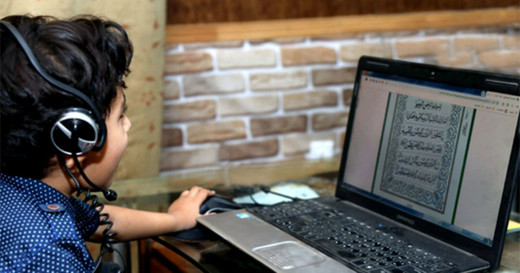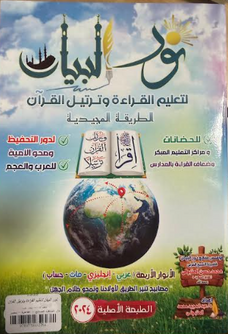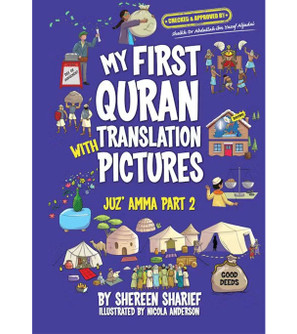How Kids Can Listen to Quran; The Art of Introducing Kids to the Quran
Introducing children to the Quran, the holy book of Islam, is a profound and meaningful endeavor for many parents and guardians. Instilling a love for the Quran and its teachings from a young age not only nurtures a strong spiritual foundation but also helps foster a sense of identity and values. However, in the fast-paced world of today, finding effective ways to engage kids in Quranic recitation and understanding can be a challenge. Fortunately, there are various approaches and resources available to make this journey enjoyable and educational. In this article, we'll explore how kids can listen to the Quran and delve into the importance of this practice in their upbringing.
Why is it essential for children to listen to the Quran, and how can parents and guardians facilitate this experience?
Children must listen to the Quran in order to learn about Islam's rich spiritual legacy and to acquire a solid moral and ethical compass. It fosters a sense of awe and ties them closer to their faith. Using a combination of audio materials, interactive tools, and family-based activities that make learning about the Quran interesting and approachable for young minds, parents and guardians can facilitate this experience.
Best Online Quran Classes: Finding the Right Platform for Quranic Learning

The pursuit of information has crossed traditional barriers in the digital age. This is especially true when it comes to studying the Quran. Nowhere is this more obvious than in the field of religious education. Online Quran classes have become a potent tool for Muslims all over the world to improve their knowledge of the Quran and their ties to their religion.
However, it might be difficult to decide which online platform is appropriate for your Quranic learning experience given the abundance of options accessible. We will examine the important criteria to take into account when looking for the best online Quran course in this part. We'll walk you through the process of choosing the platform that best suits your unique aims and tastes, from features to advantages.
This guide will assist you in making an informed decision and starting a fruitful Quranic study journey, whether you're a novice or looking to improve your current understanding.
Let's start by looking at the crucial elements to take into account while comparing the available online Quran classes.
Online Quran Websites: Navigating the Digital Quranic Landscape
In today's interconnected world, the internet has become a vast treasure trove of knowledge, and Quranic education is no exception. Online Quran websites have flourished, offering a wealth of resources and opportunities for individuals seeking to deepen their understanding of the Quran. Navigating this digital landscape effectively is crucial to accessing reliable, insightful, and comprehensive Quranic information.
Top Websites for Quranic Resources
We've produced a list of some of the best websites that offer priceless Quranic materials to help your journey across the digital Quranic world easier. These websites are famous for their precision, usability, and dedication to disseminating knowledge of the Quran. Some of them are as follows:
- Almadinah. Media:is a well-known website devoted to provide thorough Islamic resources and learning tools. In-depth tafsir (interpretation) of Quranic passages are among the many types of information available on this website, along with Quranic recitations, lectures by eminent scholars, and other resources.
It is a useful tool for Muslims who want to learn more about Islam and the Quran. Al-Madinah Media stands out for its dedication to imparting accurate and trustworthy Islamic knowledge, making it a reputable resource for people seeking spiritual advancement.
Its user-friendly interface makes it simple to access a large collection of Islamic content, encouraging users from all over the world to feel more connected to their faith.
Al-Madinah Media's offers appeal to a wide range of people with a hunger for knowledge, whether you're a beginner or a scholar of quranic wisdom.
- Bayyinah Institute: Led by renowned scholar Nouman Ali Khan, Bayyinah offers an array of Quranic resources, including detailed explanations of Quranic verses, courses, and engaging videos that delve into the Quran's linguistic beauty.
- Al-Islam.org: A treasure trove of Islamic knowledge, this website provides access to the Quran, Hadith (sayings and actions of Prophet Muhammad), and numerous articles and books on various Islamic topics.
- Tanzil.net: If you're looking for a Quranic website with multiple translations and recitations, Tanzil.net is an excellent choice. It offers precise Quranic text along with clear, high-quality audio.
- IslamicFinder.org: In addition to the Quranic text and translations, IslamicFinder.org provides a user-friendly prayer time and Qibla direction calculator, making it a valuable resource for daily Islamic practices.
Check out our collection of Mushafs here:
Interactive Learning Tools
The way people interact with Quranic teachings has been transformed through interactive learning tools. These resources provide interesting, dynamic, and interactive methods to learn about the Quran. The following interactive resources will help you learn more about the Quran:
- Mobile applications like "Quran Companion" and "iQuran" offer interactive features like audio recitations, translation, and tafsir, making learning the Quran possible on your smartphone or tablet.
- Online Quranic Courses: Platforms like "Bayyinah TV" and "Al-Maghrib Institute" offer structured online courses taught by experienced scholars. These courses often include live sessions, quizzes, and interactive discussions.
- Quranic Games: Educational games like "Quran Explorer" and "Quran Quiz" are designed to make learning the Quran fun and engaging, particularly for children.
Navigating the digital Quranic landscape can be a transformative experience, allowing you to access the Quran's wisdom with ease and convenience. Whether you choose to explore reputable websites or engage with interactive learning tools, these resources are designed to enrich your Quranic journey.
Check out our guide to the most fun Quran activities for kids here.
Shahada Quran Verse: Unraveling the Testimony of Faith
A significant Quranic verse that forms the cornerstone of Muslim theology is the Shahada, the Islamic statement of faith. The Quranic verse that best captures the spirit of the Shahada will be examined in detail in this part, along with its profound significance and effect on Muslims all over the world. Let's go out on a trip to understand the Quran's testimony to faith.
Knowledge of the Shahada
The Shahada, which is a profound expression of belief that characterizes an individual's Islamic faith, is "La ilaha illallah, Muhammadur rasulullah" (There is no deity but Allah, and Muhammad is His Messenger). We'll examine the Shahada's layered meanings, its historical setting.
Understanding the Shahada
The brief affirmation of Islam's core principles is found in the Shahada, the Islamic declaration of faith. It is divided into two parts:
Monotheism: The core Islamic principle of "There is no god but Allah" affirms that there is only one true and unchangeable deity (Allah). It underlines that Allah is the only deity deserving of worship.
Prophethood: The statement "Muhammad is the Messenger of Allah" denotes the acceptance of Muhammad's prophethood and designates him as the ultimate messenger sent by Allah to lead humanity.
The belief in one God and the prophethood of Muhammad are encapsulated in the Shahada as a whole, serving as a concise and fundamental expression of a Muslim's religion and laying the groundwork for Islamic identity and practice.
Shahada References in the Qur'an
Tawhid (Monotheism): Quran 112:1-4 ("Say, 'He is Allah, [Who is] One, Allah, the Eternal Refuge. He neither begets nor is born, nor is there to Him any equivalent.'") underscores the oneness of God.
Prophethood of Muhammad: Quran 48:29 ("Muhammad is the Messenger of Allah, and those with him are forceful against the disbelievers, merciful among themselves.") confirms the prophethood of Muhammad.
These verses emphasize the key concepts of the Shahada, making them fundamental to Islamic belief as outlined in the Quran.
Quranic Verses on Pillars of Islam: Exploring the Foundations of Faith
The fundamental values that Muslims live by are known as the Five Pillars of Islam. We will take a tour through the Quranic passages that shed light on these fundamental acts of devotion in this section. The Quran provides direction and context for each of these pillars, including daily prayers, Ramadan fasting, charitable giving, making the pilgrimage to Mecca, and, most significantly, the proclamation of faith. We obtain a comprehensive grasp of how the Quran shapes and supports the tenets of Islam's faith by studying these verses in depth.
Connection between Shahada and Other Pillars
The Shahada, as the first pillar of Islam, lays the foundation for the other Four Pillars.
Salat (Prayer): It reminds Muslims of their core beliefs in God and the Prophet during daily prayers.
Zakat (Charity): Belief in the Shahada encourages generosity and compassion towards others.
Sawm (Fasting): Fasting during Ramadan reinforces the spiritual commitment of the Shahada.
Hajj (Pilgrimage): Pilgrimage to Mecca is an expression of devotion to the faith affirmed in the Shahada.
The Shahada, as the declaration of faith, underpins and connects all the other Pillars, shaping a Muslim's religious life and practice.
Strengthening One's Faith through Quranic Wisdom
Regular Recitation: Recite and reflect upon the Quran regularly to draw spiritual guidance and inspiration from its verses.
Understanding and Contemplation: Seek a deeper understanding of Quranic verses by studying their meanings and context, allowing for personal reflection and application in daily life.
Prayer and Connection: Establish a strong connection with Allah through prayer (Salat) and supplication (Dua), seeking guidance and strength to navigate life's challenges.
Community and Learning: Engage with a community of believers and scholars to share knowledge, experiences, and interpretations of Quranic wisdom.
Acts of Kindness: Implement Quranic teachings by performing acts of kindness, charity (Zakat), and good deeds to strengthen faith through actions.
Self-Improvement: Strive for personal growth and moral development, aligning one's life with Quranic values, which ultimately deepens faith and spiritual fulfillment.
Why Is Shahadah Important: The Profound Significance of Bearing Witness

In Islam, the statement of faith known as the Shahadah is of utmost significance. We will examine in detail why the Shahadah is a pillar of the Islamic religion in this part.
It represents a lifetime commitment that has spiritual, symbolic, and practical resonance in a Muslim's life and goes beyond a simple verbal declaration. We can acquire insight into the key role that bearing witness plays in the Islamic religion by realizing the tremendous significance of it.
Spiritual and Practical Significance
The Shahada's assertion of monotheistic, which upholds faith in the existence of the only real God and the finality of Muhammad's prophethood, is what gives it its spiritual value. It directs a Muslim's faith and commitment by serving as a daily spiritual reminder of these fundamental principles.
In actuality, the Shahada serves as a person's official conversion to Islam and admission into the Muslim society. It serves as the basis for all moral behavior and religious acts. It fosters a sense of belonging and community by uniting Muslims around the world under a same religion and identity.
It also influences moral judgment, directing Muslims to abide by Islamic principles and take responsibility for their deeds in this life and the hereafter.
Shahada's Role in a Muslim's Life
The Shahada is a succinct declaration of faith that says, "There is no god but Allah, and Muhammad is the Messenger of Allah." A person formally converts to Islam by saying these words with sincerity and believing them to be true. One can be identified as a Muslim by their core beliefs.
Monotheism: The Shahada's opening phrase, "There is no god but Allah," reaffirms the central Islamic conviction that there is only one true deity (Allah). It emphasizes Islam's monotheism and seeks to serve as a reminder to Muslims that they only worship and submit to one God.
Belief in Prophethood: The second part of the Shahada, "Muhammad is the Messenger of Allah," acknowledges the prophethood of Muhammad. It signifies a Muslim's belief that Muhammad was the final prophet sent by Allah to guide humanity and deliver His message.
Foundation of Faith: The Shahada is not just a verbal declaration; it represents the foundation of a Muslim's faith. It is the starting point of one's journey as a believer and forms the basis for all other religious practices and beliefs in Islam.
Daily Reminder: Muslims are encouraged to recite the Shahada regularly, both in their daily prayers and as a general expression of faith. It serves as a constant reminder of their beliefs and strengthens their connection to Allah and the teachings of Muhammad.
By investigating these portions, we shall learn the profound justifications for the Shahadah's relevance, underlining its spiritual, practical, and all-encompassing value in a Muslim's life. In the end, the Shahadah is more than just a declaration of faith; it is a beacon that shows Muslims all across the world the way to piety, obligation, and faith.
Shahada Recitation: Embracing the Declaration of Faith
The Shahada, an Islamic confession of faith, is more than simply a simple affirmation of one's confidence in the uniqueness of Allah and the prophethood of Muhammad. This section will go into detail on the significance of reciting the Shahada and how doing so is a concrete way to demonstrate one's faith. A Muslim's acceptance of the statement of faith marks a crucial turning point in life, and comprehending its depth is necessary to recognize its spiritual influence.
The Beauty of Shahada in Arabic
The Shahada, when recited in its original Arabic form, holds a unique and profound beauty. Its melodious rhythm and poetic nature make it a source of inspiration and reflection for Muslims worldwide. In this part of our exploration, we will explore the aesthetic and linguistic aspects of the Shahada in Arabic, delving into the lyrical quality of its words and the timeless beauty it carries.
Tips for Correct Pronunciation
Listen Actively:
Pay close attention to how native speakers pronounce words and phrases. This can be done through conversations, audio materials, or online resources.
Practice Regularly:
Pronunciation, like any skill, improves with practice. Dedicate time each day to practice pronouncing words and sounds correctly.
Phonetic Transcriptions:
Learn and use phonetic transcriptions to understand how words are pronounced. Tools like the International Phonetic Alphabet (IPA) can be very helpful.
Break Words into Syllables:
Break words into syllables and practice saying each syllable separately before pronouncing the entire word. This can help you master tricky combinations of sounds.
Use Online Resources:
There are numerous online resources, including pronunciation guides, videos, and apps, that can help you hear and practice correct pronunciation.
Record Yourself:
Mouth and Lip Movements:
Pay attention to the movement of your mouth and lips when pronouncing different sounds. Mimicking these movements can improve your pronunciation.
Use a recording device or smartphone to record yourself speaking. Compare your pronunciation to native speakers and identify areas for improvement.
Online Quran courses and websites have created new opportunities for Quranic study and inquiry in the current digital era. These platforms facilitate easier access to Quranic information and encourage a stronger bond with one's religion.
The Shahada, the declaration of faith that establishes Islam, is essential to this spiritual journey. In addition to examining its meaning in both Arabic and English, we also looked at where it fit within the context of the Five Pillars of Islam. The verses of the Quran that make mention of Shahada serve as a reminder of its significance and its relationship to other facets of Islamic practice.
Take the next step on your Quranic journey and explore these online resources to enhance your understanding and recitation of the Shahada. May your pursuit of faith be enriched with knowledge, guidance, and a strengthened connection to the divine
















